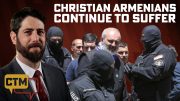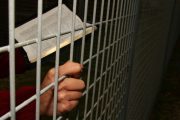American student Otto Warmbier (shown) was recently seen in a video released by North Korea, after being accused of crimes against the state, tearfully pleading for mercy. But the University of Virginia student’s request fell on deaf ears, and his captors sentenced him to 15 years hard labor. And that’s even worse than it sounds, says an ex-North Korean prisoner, as the 22-year-old will face a torturous existence under Auschwitz-like conditions.
Kang Chol-hwan knows whereof he speaks, as he’s a rare individual: someone who escaped a North Korean prison camp (in 1992). As for what awaits Warmbier, Kang “described how prisoners are woken up at 5am and are forced to work until sunset,” writes the Express. “He said: ‘We are forced to watch public executions. We are physically abused — hit and tortured. I think of it as another form of Auschwitz.’”
Warmbier’s 15-year, hard-labor sentence was handed down merely for stealing a propaganda banner. But harsh justice, and injustice, is the norm in the hermit state. In 1977, Kang was sentenced to more than 10 years punishment at a political prison in Yeoduk-gun, Hankyongnamto province, a facility technically called “DPRK guard division No. 15.” He was only 10 years old. His crime?
Being born into the wrong family.
After Kang’s grandfather was convicted of “treason,” all his family members were forced into prison camps. As Kang put it writing for NBC News in 2003, he has been told that North Korea’s rules dictate “that political prisoners should have three generations eradicated. This is in order to eradicate the seed of revolt. And the political prisoners, they should give up hope of being treated as human beings.” This certainly sheds light on why, after North Korean leader Kim Jong-un’s uncle was executed for treason, the regime proceeded to eliminate all his biological relatives.
Of course, since North Korea seeks to use American prisoners as bargaining chips and thus has a vested interest in their health, it’s possible Warmbier will receive better treatment than the hundreds of thousands of North Korean citizens languishing in prison camps. But even a small taste of what Kang experienced is horror-film worthy. Just consider the following from Kang’s 2003 testimonial:
Normally there are cases of execution in public [in the camps], several times a year. Before the execution they [the condemned] were tortured. They were not given food, and the joints of bones are separated, and the bones are exposed, sticking out of skin. And they become light enough to carry by hand after torture and starvation.
The other factor working in Warmbier’s favor is that his bargaining-chip status could result in his being released early after some future negotiation. Nonetheless, many have wondered what possesses certain Westerners to travel to what is certainly one of the most bizarre and despotic regimes in world history.
While it’s common today to emphasize how everyone “is just like us,” it’s easier to understand foreign cultures by viewing their peoples as “aliens,” as retired Army intelligence officer Col. Ralph Peters once put it. There’s a reason, after all, why synonyms for “foreign” are “strange” and “unknown.” And what you don’t know can hurt you.
Former Army sergeant Charles Robert Jenkins found this out the hard way. Not feeling equal to the task of fulfilling his military duties and having gotten drunk, the soldier crossed the two Koreas’ demilitarized zone one night in 1965 and surrendered to the North Koreans. He realized it was a mistake almost immediately. And he would spend four decades in the nation, and among the lessons he learned was, wrote Time in 2004, “In North Korea, when you lie they think you are telling the truth,” he says, “and when you tell the truth they think you are lying. You learn real quick to say no when you mean yes, and yes when you mean no.” The North Koreans, being weaned on lies, are well out of touch with reality.
In other words, it doesn’t take much for these aliens to imagine you’re an “American spy” or some other enemy of the state. Yet everyone has shortcomings with respect to grasping reality, and this brings us to Western travelers and the dangers of cultural misunderstandings.
Warmbier’s woes are reminiscent of the case of Michael Faye, the 19-year-old American “caned” (a type of flogging) in Singapore in 1994 after vandalizing some automobiles. While it created an international incident, I was struck by how someone would be brazen enough to commit such an act in a foreign country with radically different laws.
Now, a disclaimer: None of what I’m about to say implies that Warmbier deserves his fate. Punishment should fit the crime, and the North Koreans’ actions are cruel and disproportionate in the extreme. Yet there’s a lesson here for all.
It’s common for people to fall victim to projection, to ascribe their motivations, mindset, and norms — and those of their culture — onto others. In addition, what’s bred into a person has a great impact. And how are too many American youth conditioned today? They’re raised in a permissive culture, where spanking and even harsh words are often frowned upon, where many would ensconce them in bubble wrap. They may not be held accountable by their parents or teachers, and even the law may administer mere slaps on the wrist. So they’re conditioned to not expect accountability. This sometimes means they will become ever more brazen until they step over a certain line and find themselves in prison.
And it can mean something even worse when they take this mentality to an alien nation. They then may learn that not only is there accountability in the world — there’s also tyranny.
Another factor is that American youth are now immersed in revisionist history and hate-America-first dogma, as they’re told the United States is among the worst of lands. And, of course, believing this, why would they even imagine that the more “enlightened” foreign nation they’re visiting could be so much worse?
It’s much as with the thousands of Americans who went to the Soviet Union during the Great Depression and relinquished their American citizenship. They’d heard it was a “worker’s paradise” that just must be better than the big bad US of A. It was a decision only some of them would live to regret. And that’s the price of lies.
Teach your children well.
Photo: Otto Warmbier




